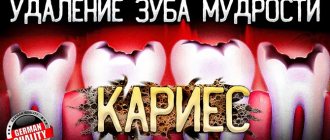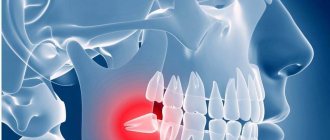Publication date: 10/10/2018
The growth of a wisdom tooth has its own peculiarities - by the time it begins to erupt, the dentition has already formed, and there is no room left for its normal development. Improper eruption is accompanied by inflammatory processes, since an infection can easily get into injured tissues.
As the process progresses deeper, periodontitis may develop. The inflammatory process is accompanied by redness and swelling of the gums, severe pain appears, and an unpleasant odor comes from the mouth. Wisdom loss can cause excruciating pain.
To eliminate toothache, you need to know the cause of its occurrence. This work can only be performed professionally by a specialist in a clinic setting. But before visiting the dentist, the condition can be alleviated a little. There are recipes that will help you independently eliminate inflammation and relieve pain, the source of which is a growing wisdom tooth.
“Eights” appear after 20 years. The pain of this process is due to two reasons:
- Wrong direction of growth;
- Inflammation of the gums due to problematic eruption.
The problem is also related to the fact that there was no milk tooth at the site of its growth, and there was no prepared socket. If the growth of a wisdom tooth is associated with prolonged pain, a visit to the doctor cannot be avoided.
Online consultation with a doctor
If you are worried about your wisdom teeth and have symptoms such as: pain in the “eights”, swelling of the gums around, swelling of the cheek. When chewing or while moving the jaw, smiling, talking, unpleasant sensations and pain appear. It is best to undergo an examination and consultation with a dentist. Because you won’t be able to cure a wisdom tooth on your own or help it erupt at home. And complications arising due to lost time can lead to the necessary more complex and expensive treatment:
- removing the “eight”;
- treatment of infected adjacent teeth;
- prosthetics;
- implantation.
Pain due to pathogenic processes in the tooth
The wisdom tooth is the most remote and it is quite difficult to maintain proper hygiene, especially if the gums around it are bothering you. Therefore, it is not uncommon for caries, pulpitis or periodontitis to develop. Then the patient feels pain in the area of the wisdom tooth.
Sharp pain is characteristic of caries; it occurs when irritants, such as hot, sweet or sour foods, come into contact with the tooth. It subsides some time after the stimulus is removed.
If there is no influence of irritants, but acute pain periodically appears, this indicates the presence of symptoms of pulpitis. Periods of pain are longer than with caries and often appear at night.
Aching pain is a sign of periodontitis, accompanied by swelling of the gums or cheeks, intensified by pressure. Advanced periodontitis affects the deeper layers of bone tissue and causes the release of pus.
If you experience any unpleasant sensations, contact a specialist. Only professional diagnostics can identify the true cause and prevent the development of more serious diseases. This is especially true for the wisdom tooth, which is more susceptible to negative factors than all other teeth.
Why do wisdom teeth hurt?
Cutting through “eights” without pain is a rare occurrence, so you need to know what to do in such cases.
There are several reasons for pain. The main ones are the following:
- The tooth grows sideways and is incorrectly positioned in relation to other teeth;
- There is no place for it to cut through;
- The tooth grows with caries;
- Poor quality treatment provided;
- The tooth has almost erupted, but is not yet completely visible, as it is covered by the mucous membrane; you should see a doctor to have the hood cut;
- Bacteria and pathogens can accumulate at the site where wisdom teeth erupt.
Rinsing with disinfectants will help. If the tooth grows normally, naturally, then it does not cause any particular trouble. Except for redness and swelling of the gums. Complications from the eruption of the figure eight, as a rule, arise due to a late visit to the dentist for help. If the pain increases and it is not possible to see a doctor, you have to take measures on your own. It should be borne in mind that all home remedies for wisdom tooth pain relief are temporary. You need to seek medical help at the first opportunity.
There are methods that can eliminate or dull pain at home. If the growing wisdom tooth is invisible and there is no discomfort, the ongoing process of eruption can be judged by the following signs:
- The gums and cheek are swollen;
- Body temperature increased slightly;
- Difficulties arise with facial expressions and chewing movements;
- The process of swallowing is associated with painful sensations.
If pain appears at the site where your wisdom tooth erupts, you should see a doctor. In cases where it is not possible to seek help from a dentist, you can use the following tips. There are five effective ways to relieve pain.
Consumer Reviews
WalkingEmotion about Asepta Active mouth rinse (irecommend.ru):
“Hello everyone) I have been seeing and treating my teeth with the same doctors in a private clinic for 10 years now. And I am very familiar with the Asepta brand, since it is the brand that has a therapeutic and prophylactic effect and is popular in the field of use for gum inflammation. The products are not the cheapest, but they are effective.
In addition to the paste, rinse and balm, I also take vitamins from this brand. But that's not all. Since my gums were inflamed, I was given an appointment with a periodontist, where I received Traumeel injections every day.
I like the packaging design of this brand. Although, of course, the main thing is the result, and not the beautiful shell...
...The tube is made of durable, aqua-colored plastic. But the substance itself has a colorless tint. The kit includes a measuring cup. For one rinse, 10 ml is enough.
I was recommended to rinse 10 ml twice a day after brushing my teeth with Asepta toothpaste. Duration of admission: 10 days.
You need to rinse for about 20 seconds and then do not eat or drink anything for half an hour. Therefore, it is better to do such procedures after eating.
The taste is minty-menthol, it still remains in the mouth for some time after use. It doesn’t turn me off, but on the contrary, you feel clean and fresh.
The product consumes quickly. There is an effect, although it manifests itself together with the use of other preventive agents. Will I buy it again? Yes. Thank you all for your attention to the review!)
lyudikt (otzovik.com):
“Good day, friends and readers of the review site! I want to write about one miracle mouth rinse - ASEPTA Activ. If you come across one, be sure to try this mouthwash. I highly recommend it. Firstly, it not only rinses the oral cavity itself, but also treats the gums, and therefore freshens breath. The effect is very, very good.
When I put this mouthwash into my mouth for the first time, it seemed to me that my mouth was just being “cleaned”. You need to rinse for twenty to thirty seconds; the first time, use just a little to maintain the required time. If you take too much, you simply won’t hold it for the right amount of time and will only “translate the product” and not feel the effect, but if you keep it for the right amount of time, then after rinsing you will feel freshness in your mouth for a long time.
According to the manufacturer itself, this is a remedy for accelerating the relief of signs of mouth inflammation, which contains benzydamine (pain reliever) and chlorhexedine (a broad-spectrum antiseptic).
As the manufacturer himself writes, it is not recommended to use it constantly; it should be used in courses of five to seven days, 2 to 3 times a day.
After use, you feel freshness and the feeling that there is not a single bacteria or parasite in your mouth.
I recommend trying this mouthwash for those who have problems with the oral cavity, it seems to eliminate them and smells so pleasant in the mouth.
The only drawback of this rinse is that it is only 150 ml in a bottle, but if you consider that you only need to use it for 5-7 days and then take a break, then it becomes clear that this is not a drawback, but on the contrary.”
Expert opinion
Emir Romanovich Omerelli
Maxillofacial surgeon, implantologist
Experience: more than 13 years
Whatever pain relief option you choose, it is important to remember that the absence of pain does not mean the absence of problems. The best option for a person with acute pain is to urgently come to the dental clinic. Moreover, acute pain is a reason for appointment out of turn and without an appointment. Timely correction of the situation - treatment or tooth extraction - will minimize the harm caused to the diseased organ of the oral cavity and the entire body as a whole.
Painkillers
In your home medicine cabinet you will probably find a remedy that will help relieve excruciating pain. But remember: any pill only temporarily relieves symptoms, but does not solve the problem as a whole. Therefore, you can’t put off going to the dentist!
General analgesics
It is recommended to take a tablet of Ketanov, Nurofen, Analgin, Etoricoxib or other analogues. The analgesic effect lasts from 1 to 5 hours. Sometimes the analgesic does not work. In this case, you cannot increase the dose of the drug; follow the instructions. Overdose causes poisoning and other serious complications.
Anti-inflammatory drugs
Ibuprofen, Paracetamol, Diclofenac and other anti-inflammatory drugs are also taken orally. They provide an analgesic effect and relieve fever, which often rises with problematic growth of the figure eight.
Topical ointments and gels
Gel Kamistad, Metrogyl Denta, Cholisal and the like give an analgesic, antibacterial and wound-healing effect. After application, the gums “freeze” for some time – 2-3 hours. Instead of ointment or gel, Angilex anesthetic spray is also used.
You can apply a piece of ice or something cold to the cheek where the tooth hurts. But do not overdo it - 5-7 minutes will be enough, otherwise severe hypothermia can lead to tissue necrosis.
Attention: do not take antibiotics without a doctor's prescription!
How to relieve the condition yourself
1. You can use pharmaceutical drugs that are available without a prescription:
- Remedies for eliminating inflammation: Ibuprofen and Paracetamol;
- Painkillers: Analgin;
- Gels for gum pain relief: Metrogyl-Denta and Xolisal;
- Antiseptics: Miramistin, Chlorhexidine;
- Maraslavin lotions will relieve swelling and eliminate pain.
2. Decoctions of medicinal herbs. Complications during the eruption of a wisdom tooth are associated with injury to the surrounding gum tissue. Without help, the consequences can be serious. If there is throbbing pain and swelling in the problem area, you should consult a doctor. The danger is that the accumulated pus can quickly spread from the soft tissue of the jaw. Frequent rinsing with a decoction of oak bark, brine, tincture of sage, calendula or chamomile is an effective remedy for relieving swelling and pain relief. You can use a decoction of chicory root.
3. If there is no pharmacy nearby, you can use salt water and soda. It is useful to drop iodine into the solution.
4. Bee products help with dental problems - propolis tincture will relieve swelling, soothe inflamed gum tissue and stop the development of infection.
5. A cold compress will temporarily soothe a sore tooth.
All of the above methods can be used temporarily until you can go to the doctor. It should be remembered that the sooner this meeting occurs, the lower the likelihood of complications.
Remember: it is forbidden to heat the sore spot, as the development of the inflammatory process will only accelerate.
The best treatment is to see a doctor
If after all the manipulations the pain does not go away, but only intensifies, swelling appears and the temperature rises, you should immediately consult a doctor.
Sources:
- https://cyberleninka.ru/article/v/kompleksnoe-lechenie-hronicheskogo-retsidiviruyuschego-aftoznogo-stomatita-s-ispolzovaniem-preparatov-lineyki-asepta Balashova L.V., Barakov M.A., Khaikin M.B. The use of "Asept" in the treatment of periodontal tissue diseases, bulletin of the medical institute "REAVIZ"
- Report on clinical trials to determine/confirm the preventive properties of commercially produced personal oral hygiene products: mouth rinse "ASEPTA PARODONTAL" - Solution for irrigator." Doctor of Medical Sciences Professor, Honored Doctor of the Russian Federation, Head. Department of Preventive Dentistry S.B. Ulitovsky, doctor-researcher A.A. Leontiev First St. Petersburg State Medical University named after academician I.P. Pavlova, Department of Preventive Dentistry.
- Report on clinical trials of anti-inflammatory balm for gums "Asepta" adhesive, St. Petersburg State Medical University, 2007
Surgical methods of treatment
In 90% of cases, problematic wisdom teeth are removed. The operation is planned only after X-ray diagnosis. The doctor must examine the condition of the tooth, the shape and position of the roots in the picture, and assess all the risks.
First, the gingival hood is excised using a surgical scalpel. Then the doctor cleans out the accumulated plaque and purulent exudate, and then washes the wound with an antiseptic. If the wisdom tooth is located vertically and occupies a normal position in the row, then there is no need to remove it.
In case of dystopia (position at an angle), removal is prescribed - the “figure eight” is pulled out with hand forceps. If the unerupted tooth lies horizontally, then it is sawed with a drill and taken out in parts, and the wound is sutured.
The operation lasts 10-40 minutes, depending on the task. The manipulations are carried out under local anesthesia, you will not feel pain.
What to do if a tooth grows during pregnancy
If a wisdom tooth grows during pregnancy, surgery is contraindicated, as this is a great stress for the child and the expectant mother. In addition, there is a risk of complications, for example, after tooth extraction, the temperature may rise or bleeding from the socket may occur. This must not be allowed!
In this case, it is recommended to use physical therapy or medication to relieve inflammation and pain. You can drink no-shpa or rinse your mouth with chlorhexidine. However, any medications should be used strictly as prescribed by the doctor; the doctor will prescribe medications that do not penetrate the placental barrier.










